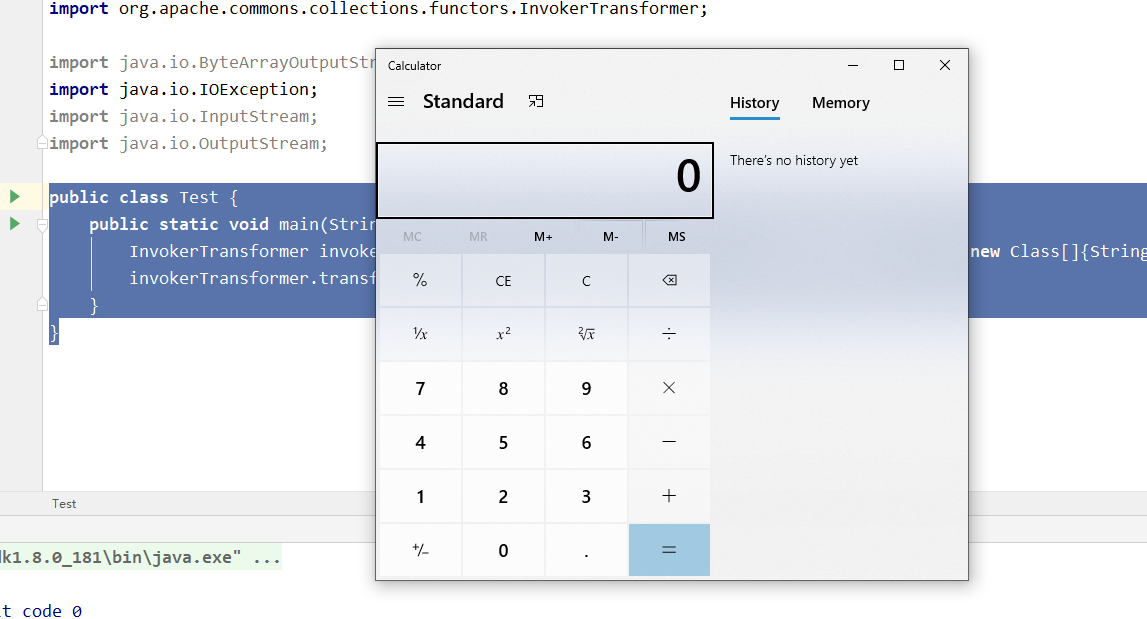InvokerTransformer类
这个类在反序列化中格外重要,一步一步学过来...
InvokerTransformer类的主要作用就是利用Java反射机制来创建类实例!
类的声明:
public class InvokerTransformer implements Transformer, Serializable
类的构造方法如下:
private InvokerTransformer(String methodName) {
this.iMethodName = methodName;
this.iParamTypes = null;
this.iArgs = null;
}
public InvokerTransformer(String methodName, Class[] paramTypes, Object[] args) {
this.iMethodName = methodName;
this.iParamTypes = paramTypes;
this.iArgs = args;
}
类的成员方法:
public Object transform(Object input) {
if (input == null) {
return null;
} else {
try {
Class cls = input.getClass();
Method method = cls.getMethod(this.iMethodName, this.iParamTypes);
return method.invoke(input, this.iArgs);
} catch (NoSuchMethodException var5) {
throw new FunctorException("InvokerTransformer: The method '" + this.iMethodName + "' on '" + input.getClass() + "' does not exist");
} catch (IllegalAccessException var6) {
throw new FunctorException("InvokerTransformer: The method '" + this.iMethodName + "' on '" + input.getClass() + "' cannot be accessed");
} catch (InvocationTargetException var7) {
throw new FunctorException("InvokerTransformer: The method '" + this.iMethodName + "' on '" + input.getClass() + "' threw an exception", var7);
}
}
}
这个类最牛的地方就是构造函数和成员方法,原因?
仔细观察,先看transform这个方法,可以看到这个方法竟然把传入的参数input通过反射来调用input类中的方法。
并且还是任意方法,因为对于getMethod中的两个参数iMethodName和iParamTypes和iArgs我们在构造函数中都可以完全可控,所以这个类很🐂!
public InvokerTransformer(String methodName, Class[] paramTypes, Object[] args) {
this.iMethodName = methodName;
this.iParamTypes = paramTypes;
this.iArgs = args;
}
public Object transform(Object input) {
if (input == null) {
return null;
} else {
try {
Class cls = input.getClass();
Method method = cls.getMethod(this.iMethodName, this.iParamTypes);
return method.invoke(input, this.iArgs);
} catch (NoSuchMethodException var5) {
throw new FunctorException("InvokerTransformer: The method '" + this.iMethodName + "' on '" + input.getClass() + "' does not exist");
} catch (IllegalAccessException var6) {
throw new FunctorException("InvokerTransformer: The method '" + this.iMethodName + "' on '" + input.getClass() + "' cannot be accessed");
} catch (InvocationTargetException var7) {
throw new FunctorException("InvokerTransformer: The method '" + this.iMethodName + "' on '" + input.getClass() + "' threw an exception", var7);
}
}
}
那肯定会说这个类要如何使用呢?就比如简单的执行命令,如下所示:
public class Test {
public static void main(String[] args) throws IOException {
InvokerTransformer invokerTransformer = new InvokerTransformer("exec", new Class[]{String.class},new String[]{"calc"});
invokerTransformer.transform(Runtime.getRuntime());
}
}




